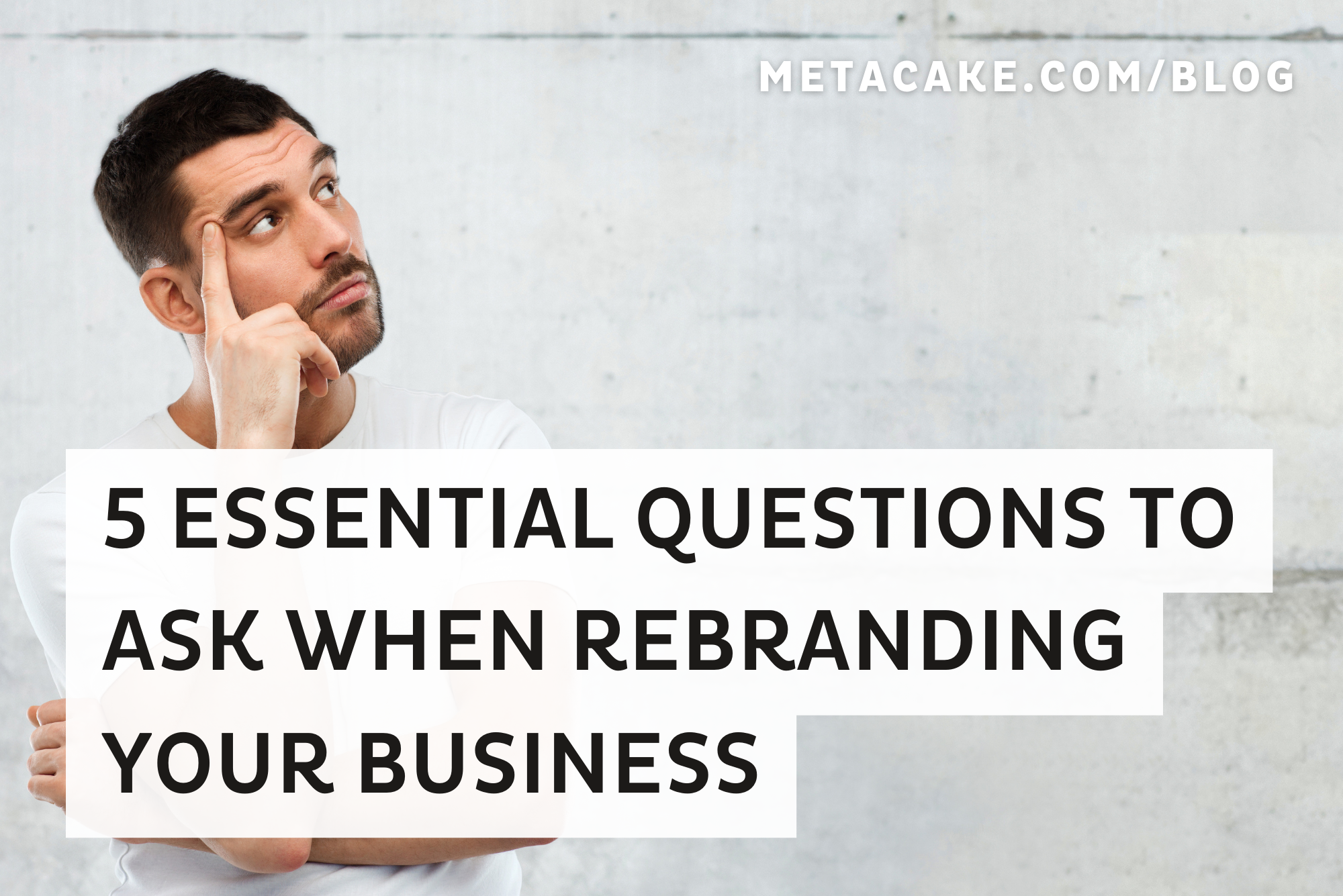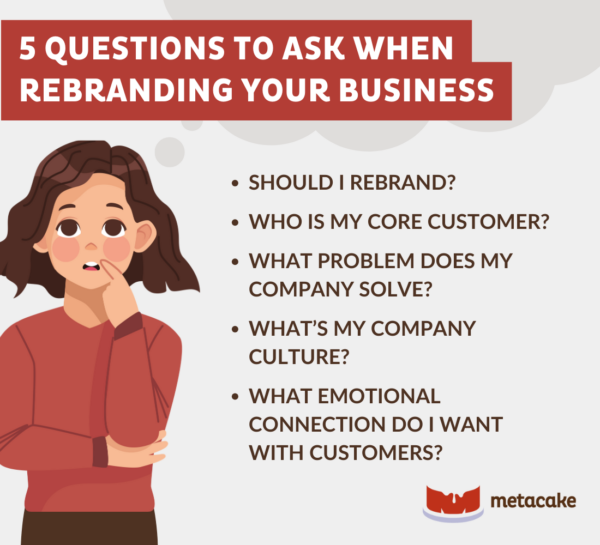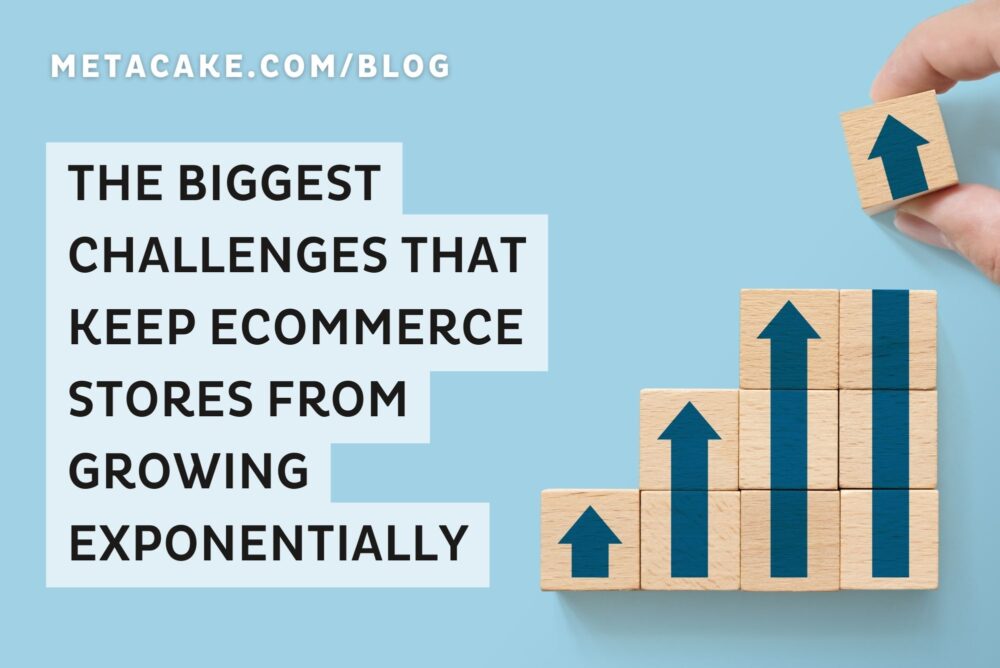
5 ESSENTIAL QUESTIONS TO ASK WHEN REBRANDING YOUR BUSINESS
Rebranding your business is a major decision that shouldn’t be taken lightly.
Your brand is the face of your company. It’s how your customers identify and connect with you. But sometimes, you’ll need to rebrand to stay relevant, differentiate yourself from your competitors, and amend your existing brand’s reputation.
Today, we’ll explore five essential questions to ask when rebranding is on the horizon. By carefully weighing each question, you’ll be better equipped to decide whether rebranding is right for your business and how to execute it successfully.

5 Questions to Ask When Rebranding Your Business
1. Should I Rebrand?
The first of the five essential questions to ask when rebranding is, “Should I rebrand at all?”
Rebranding can be a good idea, but also presents a tremendous risk. Your brand is how your customers know your company. If they react negatively to a brand change — even a subtle one — your bottom line will suffer.
So, only rebrand if you have a legitimate reason. Here’s when rebranding is a good idea:
Audience Disconnect
The goal of having a brand in the first place is to connect with your target customer. If you’re struggling to make a connection under your current brand, you may want to consider a rebrand.
Outdated Representation
Has your business model, product, company, or culture has changed? Your current brand may no longer represent your organization’s core values.
If there’s one thing your brand must do, it’s accurately represent who you are and why you’re in business. When it doesn’t, you miss out on the opportunity to create meaningful and lasting relationships with your audience.
Poor Quality
Perhaps when you started your business, you didn’t have the resources to invest in a high-quality logo, or you simply didn’t think a high-quality logo was important. It is.
To clarify, your brand isn’t your logo. Your brand is the emotional connection your audience feels when interacting with your business. Your logo is simply your brand’s visual representation.
However, this visual representation is important. So, if you have low-quality brand assets, invest in an updated look.
Differentiation
You may want to consider a rebrand to differentiate yourself, either from your competitors or from the business you used to be.
If competitors have copied your brand and your business model, a rebrand could set you apart by updating your value proposition. But be aware: If your audience isn’t sold on your new image and your bottom line suffers, your rebrand could give your competitors a leg up.
Reputation
If your brand has a poor reputation, you may not be able to salvage it under your existing brand. A partial or total rebrand will wipe the slate clean and help you start fresh.
If, after considering these factors, you’re convinced you need to rebrand, the remaining questions will help you determine what your new brand should look like.
2. Who Is My Core Customer?
This is an absolutely essential question to ask when rebranding. Defining your core customer will inform the tone of your brand messaging, your tagline, your colors, and your logo.
For example, if your audience is highly creative, your new brand will differ starkly from one that’s directed toward a corporate audience.
3. What Problem Does My Company Solve?
The pain points your product addresses inform your brand voice more heavily than you might think. It’s important to understand your target audience’s challenges, frustrations, and desires, as these factors will shape the way you communicate with them.
For example, if your product solves a particularly sensitive issue, such as a medical condition or a private struggle, your messaging must be more delicate, empathetic, and understanding than it would be for a mainstream issue. In these cases, your brand voice should be caring, compassionate, and non-judgmental, making your audience feel supported and understood.
On the other hand, if your product addresses a more common, light-hearted problem, such as a lack of time for hobbies or difficulty finding the perfect gift, your brand voice can be more playful, humorous, and relatable. You can use a more casual tone and incorporate jokes or puns.
4. What’s My Company Culture?
Consider your company’s core values, mission, and vision. These elements form your culture’s foundation, so it’s important to place them at the heart of your rebranding strategy.
Moreover, consider how your company culture is reflected in your day-to-day operations, customer interactions, and internal communications, and align your rebranding with these aspects of your business. For example, if your company is known for its friendly and approachable customer service, your new brand should reflect this through its tone of voice, visual elements, and messaging.
If your new brand deviates from your company culture, it may come across as inauthentic or confusing to employees and customers alike.
5. What Emotional Connection Do I Want With Customers?
As mentioned, your brand is the emotional connection you create with your customers. So, what do you want this connection to be?
This is perhaps the most important of our five questions to ask when rebranding. Your brand is the narrative that communicates who you are, what you stand for, and why your customers should care about your business. Even if you don’t tell this story explicitly, it informs the reason your business exists and guides the emotional connection you develop with your audience.
Your brand story isn’t a one-time exercise. Weave it into all your branding touchpoints, from your logo and website to your social media presence and customer interactions. By staying true to your brand story, you can build a strong, lasting emotional connection with your customers that sets you apart from the competition.
Questions to Ask When Rebranding: Final Thoughts
Your brand is your most valuable asset. It’s more than just a logo or a catchy slogan; it’s the emotional connection your customers have with your product or service.
Your brand is the sum of every interaction a customer has with your company, from the first time they hear about you to the moment they make a purchase and beyond. It’s the feeling they get when they think of your product, and it sets you apart from your competitors.
Other companies can copy your product, but they can’t copy your brand. Your brand is the largest moat you can build to keep competitors at bay. So, take these five questions to ask when rebranding seriously, and develop a brand that stands the test of time.


